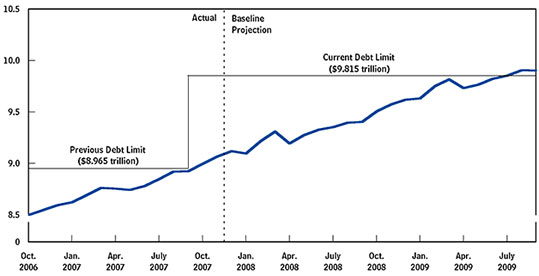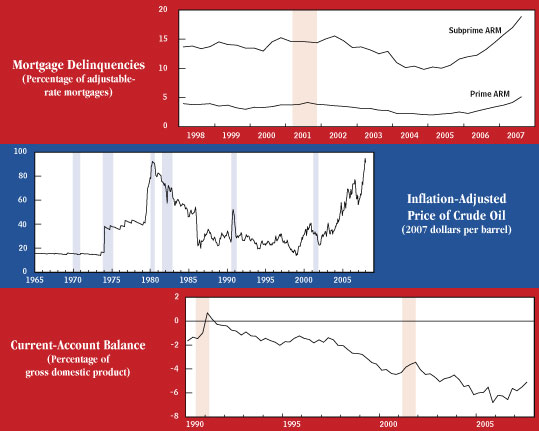Moran's Multimedia
View floor speech on gas prices.
Economy
Protecting our long-term economic health and well-being is one of Congressman Moran's top priorities. Throughout his time in Congress he has served as a leader on economic and financial issues, including fiscal responsibility, the current housing crisis, and foreign investment in the United States.
Currently, our country is in or approaching recession. Adjusted for inflation, after-tax incomes have contracted in two of the last three quarters. Personal income is falling so much that Joseph LaVorgna, the chief U.S. economist at Deutsche Bank, reported that individual income tax receipts are currently experiencing the worst falloff since the 2001 recession.
Part of the problem is the credit crisis and explosion of U.S. debt over the last seven years. As of December 7, 2007, the total outstanding debt was $9.166 trillion (see chart below), which is approximately 65% of U.S. Gross Domestic Product—an amount equal to over $30,000 per citizen. That debt causes two deep concerns. First, it means that we must spend an ever increasing percentage of our taxes paying interest on our debt (we averaged 9% in 2007), and, secondly, foreign countries now hold 43 percent of our debt. That means we send over $60 million of our taxes to China every day just to pay interest on our debt-money Congressman Moran would much rather see devoted to education, health care, or other important priorities at home. Many point to our record breaking foreign debt as the biggest single cause of the record breaking fall of the U.S. dollar in international markets.
Congressman Moran has also been outspoken on the issue of federal fiscal responsibility. The President's poor fiscal policies have increased the national debt at a rate of at least $16,000 per second. Over the long term, these exploding budget deficits harm our economy and leave a horrendous legacy for our children and grandchildren. Congressman Moran is a strong supporter of pay-as-you-go budgeting, and believes that Congress must not pass the costs of our fiscal choices onto our children and grandchildren.

Sovereign Wealth Funds
Congressman Moran recently kicked off a bipartisan working group on Sovereign Wealth Funds (SWFs). As the dollar has declined and our foreign debt holders have looked for other ways to invest their savings from the sale of oil or from the interest we pay on our debt, countries such as Norway, China, Singapore, Saudi Arabia, Venezuela, and China have used their accumulating savings to create Sovereign Wealth Funds. Instead of buying U.S. Treasury notes, these countries have created investment funds, somewhat like pension funds, to make state-purchases or investments around the globe.
According to the Congressional Research Service, the research arm of Congress, sovereign wealth funds manage an estimated $2.2 trillion and will grow to more than $13.4 trillion over the next decade-or approximately the size of all the companies listed on the New York Stock Exchange. Recently, they have begun purchasing large stakes in major U.S. financial institutions, including Citigroup, Merrill Lynch, and Morgan Stanley. Congressman Moran believes that the importance of SWFs in the global economy warrants further discussion and attention by Congress, particularly regarding the transparency of SWF operations, and the potential for the funds to be used for geopolitical, rather than financial goals.

Congressman Moran has also been a leader in responding to the current crisis in the housing market. He feels strongly that we need a broad-based response to the current economic woes that goes beyond the recently-enacted stimulus plan to address the problems in the housing market that are causing our economic malaise. In particular, Congressman Moran has been an advocate for increased funding for foreclosure mitigation counseling, which has made great strides in helping families avoid foreclosure.
Latest News On Economy
June 12, 2008
House Extends Unemployment Benefits
May 21, 2008
House Passes ‘Green’ Renewable Energy and Job Creation Act
May 8, 2008
Comprehensive Plan to Address Housing Crisis Passes House
March 5, 2008
Joint Statement of Task Force Founders Moran and Davis
January 29, 2008
Economic Stimulus Package Passes House
In This Section
- Animal Protection
- Information Technology
- Darfur
- Iraq
- Economy
- Labor
- Education
- Small Business
- Environment
- Social Security
- Federal Employees
- Transportation
- Healthcare
- Veterans
- Immigration
Upcoming Events
Moran E-newsletter
Sign up to receive email updates from the Moran e-News.
